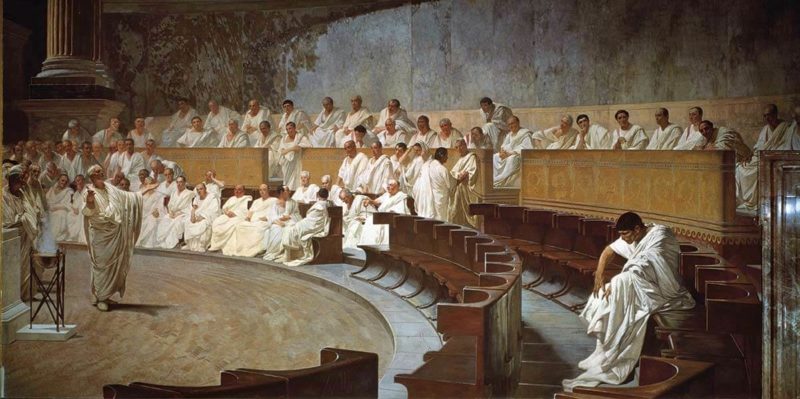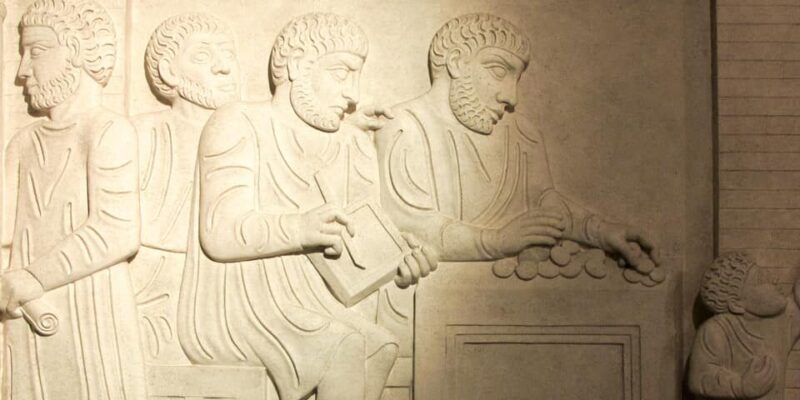We explain what Roman law is, its characteristics and its stages. In addition, the bases of its origin and its principles.
What is Roman law?
Roman law is the set of rules and laws that existed in the different periods of ancient Roman society , from the 5th century BC. C . until the death of Emperor Justinian I in AD 565. C. The oldest evidence of the Roman legal system is the text "The law of the XII Tables" from the middle of the 5th century BC. C. that details rules of coexistence for the people of Rome.
At the beginning of the 6th century, Emperor Justinian I compiled the legal texts of the time into a single legal text called Corpus iuris civilis, which means “Body of civil law ”. It consisted of the most influential legal document in history that established a parameter of what was allowed and what was prohibited.
Furthermore, the emperor convened a committee to select the Roman lawyers. From then until today, the legal order is maintained and updated as societies evolve.
Roman law was the basis of the modern legal order worldwide, with the exception of the nations in which Muslim, Hindu and Chinese law are applied, in addition to customs that are not written but are followed by tradition or social ethics and differ from one culture to another.
Starting in the 18th and 19th centuries, several European countries began to replicate the foundations of Roman law for the legal system of their nations. For example: Spain promulgated the Commercial Code in 1885 and the Civil Code in 1889, laws that remain in force although they have undergone several modifications over the years.
Characteristics of Roman law
Roman law was characterized by:
- Establish norms that impose social duties and establish the bases for the coexistence of the population.
- Reflect important changes in the legal order of Ancient Rome.
- Being the antecedent of the division of powers and Civil Law today.
- Being bilateral , that is, it requires the interactivity of two or more parties, such as the State and the people, who must fulfill obligations reciprocally.
- Not recognizing the right of equality for the entire population , since it continued to consider slaves as property of the nobility.
Stages in the development of Roman law

Roman law throughout the history of Rome was divided into the following stages:
- Ancient law (753 - 130 BC) . It was the stage that was characterized by the norms based on customs and that were embodied in the Law of the XII Tables that was directed to the population and resulted in a rigid and severe legal order.
- Classical law (130 BC - 230 AD). It was the stage that was characterized by the organization of jurisprudence of the legal order, such as the Senate and by formalizing the law as a science.
- Postclassic law (230 - 527 AD). It was the stage that was characterized by the absolute power exercised by the emperor to regulate the areas of public and private life of citizens.
- Justinian Law (527 - 565 AD). It was the stage that was characterized by a legislative reform that made it possible to compile the norms and laws in force, in a formal and codified way, in a single text.
Bases of Roman law

The main bases that gave rise to the Roman law of Ancient Rome were:
- Customs. They were the first social norms adopted.
- The law . They were rules established by the authorities, such as the collection of taxes or the deprivation of rights for those considered slaves.
- The plebiscites. They were the legal procedures in which a popular vote was called.
- The jurisprudence . It was the adoption of law as a science , made up of sentences and decisions by a court of justice .
- The Senate consults. They were the representatives of the ruling class who took deliberations of the Senate with the value of law.
- The imperial constitutions. They were the regulations established by the emperors.
Principles of Roman law
Roman law promulgated three general principles formulated by the Roman jurist Domicio Ulpiano, advisor to the Emperor Alexander Severus.
The three general principles were:
- Honeste vivere (live honestly). It consists of a moral and legal precept.
- Alterum non laedere (do not harm the other). He who harms others violates their rights and is exposed to sanction.
- Suum cuique tribuere (give each his own). It consists of complying with the law, contracts, agreements and recognizing the rights of others.
Abubakr Conner brings a diverse skill set to our team, and covers everything from analysis to the culture of food and drink. He Believes: "Education is the most powerful weapon that exists to change the world." .
Leave a reply
Your email address will not be published. Required fields are marked *Recent post

Sport: What Is It, Types, Risks, Features, Characteristics and Examples

Dogs: Emergence, Features, Characteristics, Feeding and Breeds

Story: Definition, Elements, Structure, Features and Characteristics

